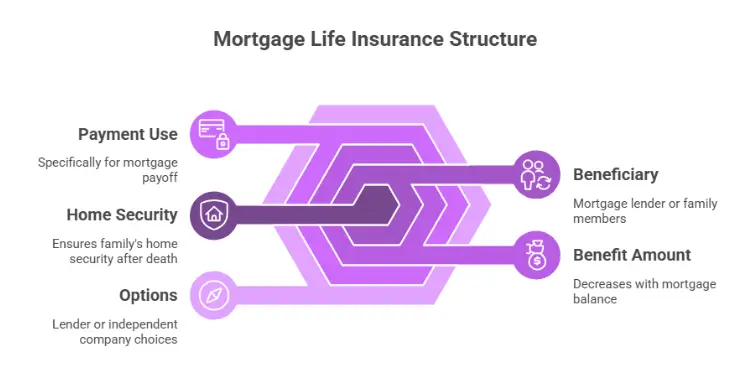Mortgage life insurance has one main goal: to keep your family safe if you die. It’s designed to pay off your mortgage. This way, your family can stay in their home without worrying about money.
Did you know almost 40% of American families would struggle to pay their mortgage after losing a main breadwinner? They would face big financial problems.
Unlike regular life insurance that helps with many debts, mortgage protection insurance only covers your home loan. The average U.S. household owes about $250,000 on their mortgage. This is a huge weight for families to carry if they lose someone.
“Financial security isn’t just about wealth—it’s about ensuring your family keeps their foundation intact,” my mentor used to say. Over a decade helping Idaho families, I’ve seen how this insurance gives them peace of mind.
When you think about getting mortgage life insurance, remember it gets less valuable as your loan gets smaller. This makes sense because your financial risk goes down as you pay off your mortgage.
Quick hits:
- Pays lender directly upon policyholder’s death
- No medical exam often required
- Coverage decreases as mortgage reduces
- Premiums usually remain level throughout
- Separate from traditional life insurance
Mortgage Life Insurance Basics and Purpose
Mortgage life insurance pays off your home loan when you die. It’s different from other life insurance that gives cash to your family. I’ve helped many families understand this difference as an insurance advisor.
This coverage helps keep your home safe. When you buy it, you ensure your family can stay in their home, even without you.
Pays Remaining Loan Upon Death
When you pass away, mortgage life insurance pays off your mortgage. It goes straight to your lender, not your family. This means your family won’t have to worry about using the money correctly.
The coverage amount changes as you pay down your mortgage. The payout goes down too, matching what you owe. This makes sense because you owe less money over time.
Even though the coverage goes down, your payments stay the same. You pay the same every month, no matter how much you owe.
| Feature | Mortgage Life Insurance | Traditional Life Insurance |
|---|---|---|
| Beneficiary | Mortgage lender | Your chosen family members |
| Benefit amount | Decreases with mortgage balance | Remains fixed throughout policy |
| Payment use | Only for mortgage payoff | Any purpose beneficiaries choose |
You can get mortgage protection from your lender or an independent company. I suggest looking at both options to find the best deal.

Mortgage life insurance is simple and clear. It ensures your home is safe for your family, even after you’re gone.
Read More:
Primary Benefits for Homeowners Families
Mortgage protection insurance does more than just pay off your home loan. It gives families important benefits that go beyond the mortgage. When tragedy hits, it creates a financial safety net. This helps with housing needs and keeps family assets safe.
This type of insurance focuses on your home investment. It’s different from life insurance that pays out to beneficiaries.
I’ve helped many Idaho families with insurance choices. Mortgage protection insurance can save a family home in crisis. It gives peace of mind, even if it costs a bit more.
Avoids Foreclosure During Grieving Period
Mortgage protection insurance gives families a break during tough times. When you die, your mortgage doesn’t stop. Without insurance, families face huge payments while they’re grieving.
This insurance acts as a buffer between lenders and families. The insurance company pays the mortgage. This stops foreclosure and gives families time to adjust.
The true value of mortgage protection insurance isn’t just financial—it’s emotional. It gives families permission to grieve without the immediate pressure of housing insecurity hanging over their heads.
This help means your loved ones don’t have to worry about money right away. The mortgage payments keep going, without needing any action from the family.
Protects Credit and Estate Equity
Mortgage protection insurance also protects your credit and home equity. If mortgage payments stop after death, it can hurt your credit for years.
By paying off the mortgage, this insurance:
- Credit history integrity for surviving spouses who shared loan responsibility
- Home equity preservation that keeps wealth within the family
- Estate simplification by removing the largest debt from probate considerations
- Future borrowing power for remaining family members
Many homeowners don’t know mortgage protection insurance keeps their home equity safe. Every payment you make adds to your home’s value. Without insurance, you might lose this equity in a quick sale.
For families with a lot of equity, this insurance can save tens or hundreds of thousands of dollars. This money can help with education, retirement, or other family needs.
| Benefit | Without Mortgage Protection | With Mortgage Protection |
|---|---|---|
| Housing Security | Potential foreclosure within months | Home remains secure indefinitely |
| Credit Impact | Severe damage to surviving co-signer’s credit | Credit history preserved intact |
| Home Equity | May be lost in distressed sale | Fully preserved for heirs |
| Family Decision-Making | Immediate financial pressure | Time to make thoughtful choices |
Mortgage protection insurance isn’t for everyone. But, it’s a key part of a family’s financial safety net. It offers special protection that other insurance might not.
Who Should Consider Mortgage Protection Policies
Not every homeowner needs mortgage protection insurance. But, certain life situations make it very valuable. I’ve helped many families find the right insurance, and I know when this policy is a must-have.
If you have health issues, this insurance is a good choice. It doesn’t need a medical check-up. This makes it easier to get than other life insurance, even with health problems.
For families relying on one income, this insurance is key. If the main breadwinner dies, it helps keep the mortgage paid. This policy acts as a financial safety net.
Those with little savings or money find this insurance very helpful. Without enough money, losing a loved one could lead to losing the home. This insurance helps keep the home safe.
I’ve seen firsthand how mortgage protection policies provide immediate relief during life’s most challenging transitions. When clients know their home is secure regardless of what happens, it removes an enormous weight from their shoulders.
Older homeowners should think about this insurance too. It helps if you’re worried about your spouse’s income after you’re gone. It pays off the mortgage, so your partner won’t worry about money.
But, if you already have enough life insurance, you might not need this. Also, if you have a lot of money to cover the mortgage, it might not be worth it.
It’s all about how much risk you’re okay with and your financial situation. Ask yourself: Would my family struggle to pay the mortgage without me? Do health issues make other insurance too expensive? Is my mortgage a big part of my debt?
If you said yes to these questions, talking to an insurance agent is a good idea. Remember, lenders don’t require this insurance. But, it’s there to protect your family’s home during tough times.
Cost Factors Age Health Outstanding Balance
When you look for mortgage life insurance, your age, health, and loan balance matter a lot. Unlike regular life insurance, mortgage protection policies are priced based on your home loan.
Age affects your premiums a lot. A 35-year-old might pay $30-45 a month for a $250,000 policy. But, if you’re 50, it could be $75-100 a month. This is because older people face higher risks.
Health also plays a role, but differently than with regular protection life insurance. Many mortgage life insurance policies don’t need a medical exam. This makes them easier to get, but they cost more.
“I’ve seen clients with health issues pay 30-40% more,” I tell families. “But, not needing a medical exam makes these policies easy to get.”
| Age Range | Health Status | $200K Mortgage | $400K Mortgage |
|---|---|---|---|
| 30-40 | Excellent | $25-40/month | $45-70/month |
| 30-40 | Average | $35-55/month | $65-95/month |
| 50-60 | Excellent | $70-100/month | $130-180/month |
| 50-60 | Average | $90-130/month | $170-240/month |
Your mortgage balance decides how much coverage you get. Bigger loans mean more coverage and higher costs. Most policies have decreasing benefits that match your loan’s decrease over time.
Mortgage life insurance costs more than term life insurance. A $250,000 term policy for a healthy 40-year-old might cost $20-30 a month. But, a mortgage life policy for the same amount could be $35-50 a month.
Term life insurance lets you choose your coverage and policy length. Mortgage life insurance is less flexible but covers your mortgage payments if you die.
The length of your mortgage affects the price too. A 15-year policy is cheaper overall but has higher monthly payments. Some policies offer extra coverage for disability or critical illness, adding 15-25% to your premium.
Remember, private mortgage insurance (PMI) is different from mortgage life insurance. PMI protects the lender if you default. Mortgage life insurance protects your family by paying off the loan if you die.
For many families, knowing their home is safe is worth the cost. But, it’s important to compare quotes to find the best deal.
Shopping for Mortgage Life Coverage Effectively
Smart homeowners look beyond their lender for mortgage life coverage. They don’t want to pay too much. Mortgage life insurance pays your home loan, but shopping wisely is key.
Get quotes from at least three providers. Lender policies can cost 20-40% more than others. You want the best coverage without high costs.
Mortgage life insurance pays your lender, not your family. This ensures your loan is paid off. But, it’s important to think about your family’s needs too.
Comparing Term Lengths and Payout Design
There are two main types of mortgage life policies. Knowing the difference is important.
Level benefit policies have the same death benefit throughout. They cost more but offer consistent coverage. Your family might get more than needed later on.
Decreasing benefit policies lower the death benefit as your mortgage does. They cost less upfront but pay out based on your loan balance. This matches the policy’s purpose better.
| Policy Feature | Level Benefit Policy | Decreasing Benefit Policy | Standard Term Life |
|---|---|---|---|
| Death Benefit | Remains constant | Decreases with mortgage | Remains constant |
| Premium Cost | Higher | Lower | Often lowest |
| Payout Recipient | Typically the lender | Typically the lender | Your chosen beneficiary |
| Flexibility of Funds | Limited (mortgage only) | Limited (mortgage only) | Complete flexibility |
| Best For | Those wanting consistent coverage | Budget-conscious borrowers | Those wanting maximum flexibility |
Ask these questions when comparing policies:
- Is the policy portable if I refinance or move to a new home?
- Are there any exclusion periods when the insurance won’t pay?
- What happens if I pay off my mortgage early?
- Can I convert this policy to standard life insurance later?
- Does the premium increase over time or stay level?
Many advisors suggest term life insurance over mortgage protection. Term life is cheaper and more flexible. It can be used for any purpose, not just the mortgage.
When comparing quotes, look at the total cost. Multiply the monthly premium by the term length. This shows the real cost difference.
Use a spreadsheet to compare policies. Track premium cost, death benefit, exclusions, and portability. This makes it easier to find the best value.
Insurance should give you peace of mind, not stress. Take your time and don’t rush. The right mortgage life insurance fits your financial plan.
Check out the below:
Next Steps for Securing Policy Approval
Ready to get mortgage life insurance? First, collect your home loan details. You’ll need the current balance, term length, and monthly payment. These help insurance companies figure out what you need.
Most applications ask simple health questions. Some policies don’t need a medical exam, but they cost more. I’ve seen approvals in just 24 hours when everything is ready.
Once you get your policy, keep it safe with other important papers. Tell your family where to find it. This way, your insurance helps your loved ones when they need it.
Don’t forget to check your coverage after big life changes. If you refinance or make big payments, you might need more insurance. Your policy basics stay the same, but your coverage should match your loan balance.
Remember, mortgage insurance is for protecting your home loan. It pays the lender, not your family directly. This keeps your family in their home, even as your payments go down.












